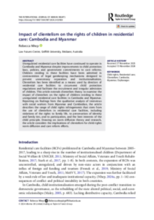Unregulated residential care facilities have continued to operate in Cambodia and Myanmar despite improvements to child protection laws, policies, and government commitments to care reforms. Children residing in these facilities have been admitted in contravention of legal gatekeeping mechanisms designed to prevent unnecessary separation and institutionalisation. Clientelism has been identified as a means used by directors of residential care facilities to circumvent child protection regulations and facilitate the recruitment and irregular admission of children.
This article extends clientelism theory to examine the impact of clientelism on the rights of children residing in these unregulated residential care facilities in Cambodia and Myanmar. Reporting on findings from the qualitative analysis of interviews with social workers from Myanmar and Cambodian, the article describes the range of child rights infringements that stem from the use of clientelism in residential care facilities, including violations of the rights to family life, to preservation of identity and family ties, and to participation, and the best interests of the child principle. Drawing on norm diffusion theory and research, the article considers the implications of clientelism for child rights norm diffusion and care reform efforts.

